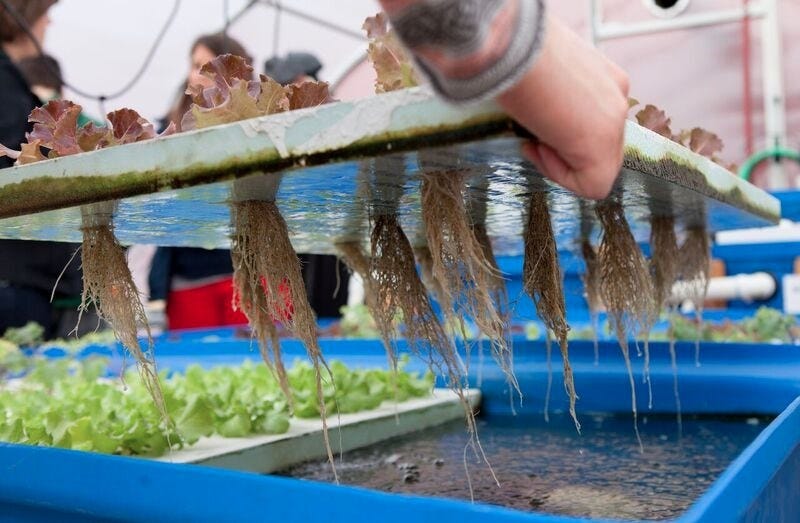Growing More Than Produce: Farm Plants Jobs For People with Autism
 Pilarski says “the roots are amazing” with aquaponics farming. (Photo credit: Michelle Roberts Owen)
Pilarski says “the roots are amazing” with aquaponics farming. (Photo credit: Michelle Roberts Owen)
Subscriber Benefit
As a subscriber you can listen to articles at work, in the car, or while you work out. Subscribe NowAn aquaponics farm in South Bend is growing job opportunities for people with autism, while also using an emerging agricultural method to provide fresh produce to local restaurants embracing the farm-to-fork movement. Mother-turned-entrepreneur Jan Pilarski planted the first seeds for Green Bridge Growers when her son, who has autism, encountered “the cliff”: education is complete, but the workplace difficult to access, and they’ve aged out of services, typically at 21. Now expanding from a prototype farm to multiple full-scale greenhouses, the company is bridging the chasm for people with autism and harvesting hope.
“[My son] wanted to offer opportunities to others in the community like him, who face some of the same challenges and similar rates of unemployment—about 90 percent for young adults on the autism spectrum,” says Pilarski, Green Bridge Growers chief executive officer and co-founder.
Her son and co-founder Chris Tidmarsh graduated from Hope College in Michigan with degrees in chemistry and environmental studies. After the social challenges of traditional employment led him to resign from his first job, Pilarski says “we tried to be creative and look at his passions.” Two common threads emerged among Chris and his peers with autism: a passion for growing food, and unemployment, despite having post-secondary degrees.
After exploring models of urban agriculture around the country, mother and son settled on aquaponics farming, an organic, self-purifying method that grows fish and vegetables simultaneously.
“It’s a closed loop; the plants clean the water and send the purified water back to the fish,” says Pilarski. “Aquaponics farming uses about 90 percent less water, because the water in the system is cleaned and purified—you just have to top it off because of evaporation.”
Resigning from her position running an academic program at Saint Mary’s College, Pilarski dedicated her full attention to the social enterprise. In 2013, she and Tidmarsh built a 400 square-foot prototype greenhouse at Hannah and Friends, a nonprofit organization in South Bend for people with special needs.
The business idea—and the produce—flourished. Pilarski found aquaponics’ demands—monitoring, scheduling and precision—to be in harmony with the skills of people with autism.
“Many people on the autism spectrum are extremely good at detail; they’re very good at following schedules and steps,” says Pilarski. “We also emphasize observation a lot, so they’re always monitoring the condition of the plants. Most of the [employees] I’ve worked with want to do something that gives back to the community or is meaningful—in this case, growing food. That’s a great match for farming.”
Green Bridge Growers is now expanding its year-round growing operation to several acres in nearby Mishawaka, where it’s building two 2,000 square-foot commercial greenhouses; one using aquaponics and the other a high tunnel method that allows for four-season growth.
The expansion will allow Green Bridge Growers to employ about eight more people initially, but Pilarski notes there are four additional acres available for expansion. She laments there are more people with autism in need of employment than she has positions to fill.
“I hope we can serve as a role model for opening doors for others to be employed,” says Pilarski. “I think others can realize the gifts that people with autism or other different abilities can bring to business. I want our message to get through to businesses to consider that possibility.”
The new greenhouses will be ready for planting in the coming weeks, and Green Bridge Growers expects to harvest about 25,000 pounds of produce annually once it’s fully operational. Pilarski says supplying local restaurants, grocers and campus food services will account for about 70 percent of its business, with farmers markets filling out the remainder.
“The restaurants have had a lot of interest from the get-go; a lot of them are going to the farm-to-table concept and are really looking for new sources of local food, and I think they find the social mission compelling,” says Pilarski. “[Restaurants] will be a very big source of sales for us.”
Operating now as what Pilarski describes as a hybrid of a nonprofit and for-profit enterprise, Green Bridge Growers’ focus isn’t the money, but the mission: feeding the community while helping people with autism satisfy their appetite for meaningful work.
Pilarski says young adults with autism face “the cliff” after high school or college graduation.
Pilarski explains the emerging method of aquaponics farming.
Pilarski is hopeful more businesses will realize that the unique abilities of people with autism make them great employees.

